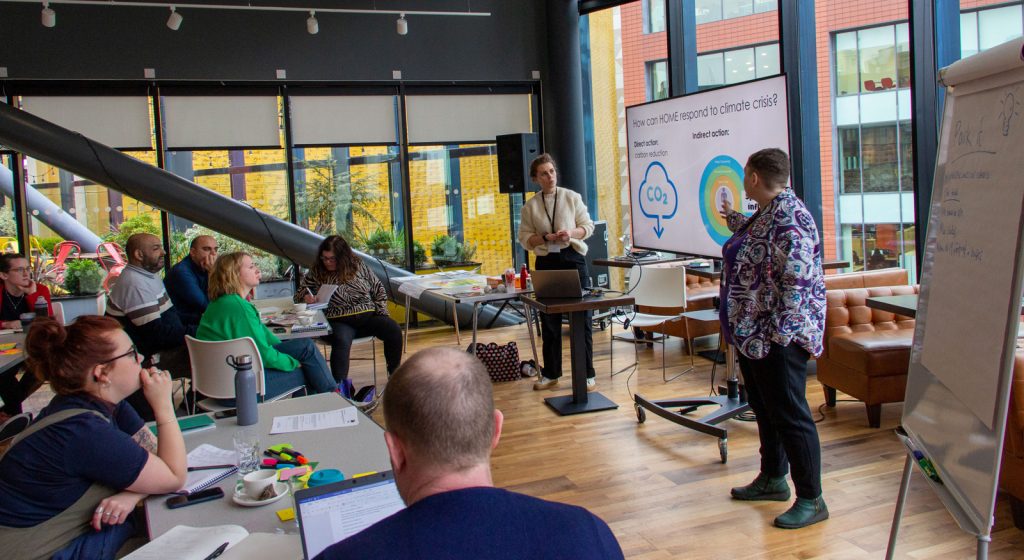
As the worldwide Coronavirus pandemic continues, some (happier, and perhaps unintentional) consequences of the international shutdown of human activity have been the temporary drop in carbon emissions and thriving wildlife enjoying homo sapiens respite. And so in the spirit of bringing some positivity to strange times, we’re continuing the CJ Green series to focus on some excellent sustainability initiatives carried out by HOME in Manchester, United Kingdom, before the lockdown commenced.
A multi-award winning, multi-purpose venue, in the north west of England, HOME is modern, colourful and usually full of bustle. May 21st this year will see HOME turn five years old in its city centre building. Over the course of its short lifespan, it has welcomed 2.9 million guests through its doors to visit one of its five cinema screens, two theatre auditoria, several art gallery spaces, and a bookshop. As well as being an aesthetically impressive space,
In its short existence it has gradually become an industry reference point for how a successful commercial business can simultaneously work to reduce its impact on the environment. And despite the added pressures of having to weather the current lockdown, HOME is still pushing forward with its commitment to reduce carbon emissions by 50% from 2020-2025, in line with Manchester Climate Change Framework’s zero carbon city region strategy.

HOME takes its responsibility to be as eco-friendly as possible very seriously and so, consequently, there’s too much to cover in just one article. For more information, check out their website as well as the interview between HOME’s Projects & Sustainability Coordinator Alison Criddle and the Independent Cinema Office (ICO).
Spreading the Message
HOME’s ethos is all about communicating what it stands for because, by doing this, others might pick up the (reusable) baton and run with it.
A substantial, twice-yearly “Green News” newsletter updates patrons and staff on sustainable progress to date. It covers everything from relevant film programming to staff training to single-use plastics, summarising all action in one handy place. And as a result of this loud, proud green message their environmental team has often been invited to speak at arts and cultural festivals around the world, including CICAE’s international training programme at the Venice Film Festival and Europa Cinemas Network Conference in Lisbon.
And boy, do they practise what they preach at HOME. From swap shops to a pool of employee bikes (to travel to nearby meetings) to actively promoting sustainable travel choices, living the green lifestyle is at the very heart of their internal staff culture. But 40% of HOME’S carbon footprint actually comes from audience members traveling to the venue. And so “way-finding” videos are embedded in HOME’s “Visit” website section, and live tram / train times are displayed on digital signage in the venue. To ensure it’s a two-way conversation as well, HOME uses pre-trailer slots to encourage audiences to put any thoughts or ideas forward about sustainable travel.

Becoming Carbon Literate
Taking “spreading the message” to a new level and, perhaps one of the most impressive outputs from HOME, is their work with Carbon Literacy. The desire to collaborate and share best practices led HOME’s environmental representatives to partner with the carbon footprint learning programme and develop a sector-specific training package.
They are now a Carbon Literate Training Organisation and also the first ever arts venue in the world to complete the training with 100% of staff. HOME was one of the first organisations to receive a “Platinum Carbon Literate Organisation” status, which is displayed with pride in their lobby. Carbon goals, right there.

A Day’s Training
The Carbon Literacy training starts with a film that explores the global impacts of climate change, which is then followed by half a day’s workshop. The purpose of the latter part is to provide participants with the knowledge and skill-set to know what to do and how to combat climate change.
To encourage proactivity, attendees are then asked to set two actions that they will be personally responsible for. At HOME this information is collated, noting who is driving that objective and what is needed to do so. This forms the basis of the company’s action plan and means it’s a live document that’s always being referred to.

Ensuring all staff receive this training means that there’s a (crucial) level of understanding and engagement behind what is trying to be achieved, which shouldn’t be underestimated. In this way, staff are fully on board with driving the initiatives.
It’s All About the Honey
How could we write a whole article about HOME and not mention what happens at the top of the building? Situated on its flat roof are two honey bee hives, a result of HOME’s commitment to supporting biodiversity and at-risk pollinating species. The hardworking honey bee is also, of course, the much-loved emblem of Manchester.
A successful fundraising effort was set up to allow the long-planned hives to go ahead. Materials and equipment were bought, and apiarist training was completed by some of HOME’s staff at the Manchester District Beekeeper Association.
Always thinking sustainably, the green-fingered team that “launched” the bee project upcycled old exhibition materials and stage props, turning them into planters.
And thanks to the happy environment they found themselves in, the bees (as bees do) produced a batch of honey that was successfully extracted from the hives. The HOME-honey quickly sold out in the bookshop and, frankly, that’s the kind of (sweet) wholesomeness for which we’re here.
CJ Green is the sustainability feature for Celluloid Junkie. If you’d like to be part of the feature, wherever you are in the world, or you’d like to nominate another company in the cinema industry who are doing their bit for the environment, then please contact Helen Budge on helen.budge@celluloidjunkie.com
- A 10th Anniversary, Theatrical Smash Hits, and a K-Pop Takeover - February 10, 2023
- CJ Interviews: Really Local Group - November 30, 2022
- The Science Behind the Impact of Cinema - August 4, 2022